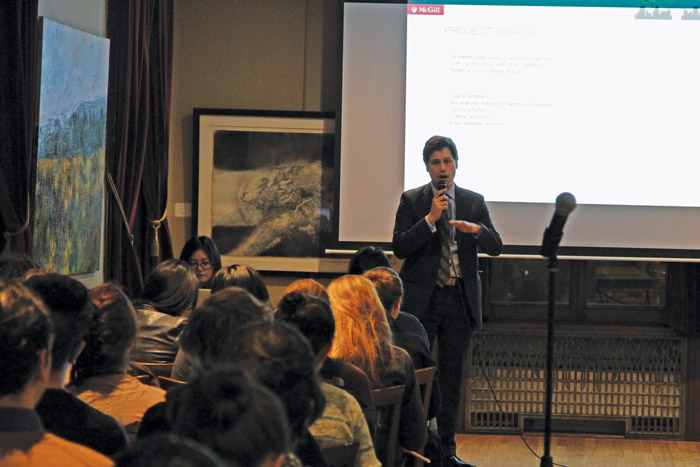Ratification of Secretary-General’s resignation
The Council passed a motion to ratify Juan Pinto’s resignation from the position of the Secretary-General. Pinto will officially leave his position on Feb. 16.
Future of Royal Victoria Hospital
McGill Vice-Principal (Communications and External Relations) Olivier Marcil spoke to the Post-Graduate Students’ Society (PGSS) Council to discuss future plans for expanding the McGill campus through the purchase of the Royal Victoria Hospital (RVH) property.
Marcil explained that concerns for the increasing lack of space on campus prompted the idea for the project. If purchased, the hospital would increase the size of the current campus by 10 per cent.
“It’s clear that at McGill, we have a deficit of space that is recognized by the government of Quebec,” Marcil said. “We are struggling to find some new space to put some bigger classes and new labs to meet our academic purpose and to make sure we can enhance of student life on campus.”
According to Marcil, purchasing and renovating the RVH would cost about $800 million. $250 million would be supplied from McGill University. The remaining $550 million would be supplied by both the federal and provincial governments. Marcil explained that McGill is tentatively looking to tear down and rebuild certain buildings within the property, although he stressed that the architectural heritage of the older buildings would be preserved in the renovation process.
PGSS Financial Affairs Officer Nikki Meadows raised a question regarding the funding for the plans.
“We know that McGill has one of the highest deferred maintenance costs across Canada, and you’re talking about a project that’s going to be roughly $250 million coming from McGill,” she said “Where are we going to get that money, because there is already a ton of maintenance that we can’t pay for?”
In response, Marcil explained that McGill had considered deferred maintenance costs when accounting for the price of purchasing RVH.
“[The funding] will come from two aspects. First, we will have to sell some of our assets,” he explained. “We also rent right now a lot of spaces in downtown Montreal that have huge costs because we don’t have the spaces on campus. In consolidating some aspects, we can save every year from it.”
Marcil stated that there is currently no clear plan for what departments or classes will be held at the RVH. A feasibility study will be conducted to assess how McGill can renovate and use the space. The full project is expected to be completed in April 2021, should the purchase go through.
As of now, there are no competing projects proposed for the RVH.
Student fees and student status
Leslie Cheung, a Sociology post-graduate student, spoke to motivate a motion regarding reinstatement fees, which are charged to students who have become de-registered from their programs and then must apply to be reinstated.
De-registration is a common result for a student unable to complete their degree within an allotted time period. For example, students in master’s programs must complete their degree within three years of registering for the program or risk de-registration. Students who exceed time limitations have the option of applying to be reinstated to their program.
A document on the McGill website explains that students applying for reinstatement would be charged tuition for the semesters in which their status was de-registered.
“Upon registration of reinstatement, the student must pay the required fees according to the scheduled thesis submission,” the statement reads. “The amount of reinstatement fees is the tuition portion of fees owed for all registered terms up to a maximum of two years prior to the term of reinstatement.”
Students who are ready to submit their thesis within two years of being de-registered are charged retroactive fees for semesters in which they were not registered, which could total up to six semesters. Students would have to pay for a student status they did not benefit from.
Cheung advocated for the immediate suspension of the current policy that charges students for student status that is not rendered.
Board of Directors proposition
Régine Debrosse, Council Director, raised concerns with the governance structure of the PGSS Board of Directors (BoD).
“I’ve identified 3 issues: One of them is the lack of independence of the board,” Debrosse said. “It would help them to be more diligent if they had an independent chair that was not necessarily the Secretary-General [….] We should let board members elect their own chair.”
Debrosse raised a second concern, stating that the BoD could also improve its stability and accessibility as an organization by increasing in the number of members on the board. She suggested adding two more members at large, which would increase the BoD’s composition from seven to nine members.
Debrosse’s third concern involved the selection procedure for BoD members.
“[Other board] members are named by board members,” Debrosse said. “I think there should be a way to elect board members in a way that’s a bit more democratic and open. So my solution is perhaps to elect board members at the [annual general meeting].”
Debrosse said that she would come to the next Council meeting with a formalized proposal.
CFS funding
In a recent referendum, the PGSS voted against continued membership with the Canadian Federation of Students (CFS). A stipulation of running the referendum was the retroactive payment of $270,000 in membership fees from the PGSS to the CFS. Health Commissioner Elizabeth Cawley expressed concerns regarding the BoD’s decision to agree to this stipulation and asked how PGSS would fund the payment.
In response, Meadows explained that PGSS would source funds through several means, including the PGSS special projects fund.
“We have a line of credit that we are working under. We are currently figuring out what the long-term solution and resolution to the situation is,” Meadows said. “But for now, we are using internal money and reallocating funds from what we have and if we need to, we have a line of credit that we can access.”








